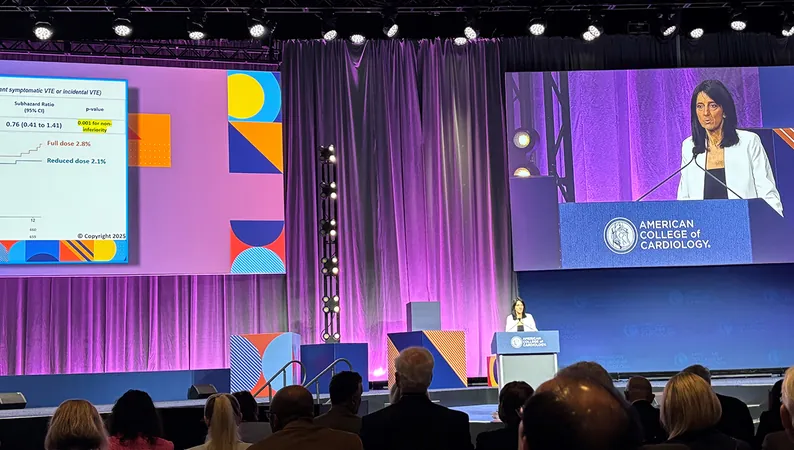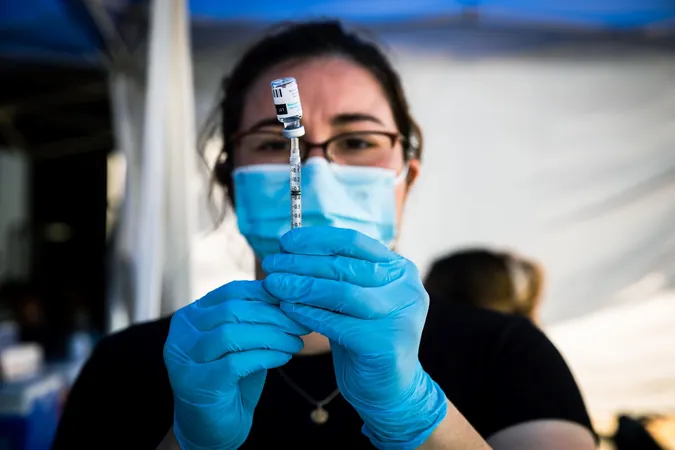
Groundbreaking Study Reveals Low-Dose Apixaban Effectively Prevents VTE Recurrence in Cancer Patients
2025-03-29
Author: Ming
In a remarkable breakthrough presented at the American College of Cardiology (ACC) 2025 Scientific Session, new research demonstrates that a lower dosage of apixaban can significantly reduce the risk of recurrent venous thromboembolism (VTE) in patients with active cancer, while also minimizing the risk of bleeding complications. This finding comes from the API-CAT trial, which provides fresh insight for ongoing patient treatment beyond the standard six months of anticoagulation therapy.
What the API-CAT Trial Revealed
The trial enrolled 1,766 cancer patients (with a median age of 69) who had developed VTE and had been on anticoagulant therapy for at least six months prior to the study. Participants were assigned to receive either 2.5 mg or 5 mg of apixaban twice daily for a duration of twelve months. The study's results showcased that those taking the lower dose experienced a recurrence rate for VTE of just 2.1%, compared to 2.8% for those on the higher dosage. Importantly, this met the trial’s noninferiority criteria, suggesting effectiveness at the lower dosage.
In addition to reduced recurrence, patients on the lower dose of 2.5 mg experienced fewer clinically relevant bleeding events—12.1% versus 15.6% for the 5.0 mg group—signifying a potential shift in prescribing practices for high-risk cancer patients.
The Changing Landscape of Cancer Care
Lead author, Dr. Isabelle Mahé from Assistance Publique–Hôpitaux de Paris, emphasized the implications of the findings during an ACC press briefing. Current guidelines recommend anticoagulation for six months following an initial VTE event; however, this new evidence supports extending therapy, particularly as cancer patients are now living longer due to improved treatments, including immunotherapy.
Co-discussant Dr. Diego Sadler from Cleveland Clinic Florida expressed optimism about the implications of this study: "This is excellent news for cardiologists and oncologists," he said, highlighting that in the U.S. alone, there are around 2 million new cancer cases each year. Many of these patients face a heightened risk of embolic events, exacerbated by the use of anticoagulants that can lead to significant bleeding.
Impact on Future Guidelines
With the implications of these findings, discussions are already underway on updating current guidelines to recommend lower-dose apixaban as a viable option for long-term management in cancer patients post-VTE. Dr. Mahé noted that the ongoing improvement in life expectancy for cancer patients necessitates a shift in how healthcare providers approach the risks and benefits of anticoagulation.
Despite the positive findings, the researchers acknowledged several study limitations, such as the exclusion of patients with brain tumors and the lack of data on long-term outcomes beyond the 12-month period.
A Call for Awareness Among Healthcare Providers
As the landscape of cancer treatment evolves and patients increasingly live with chronic conditions, Dr. Bonnie Ky of Penn Medicine urged cardiologists and healthcare professionals to recognize these advancements. "We need to mitigate the complications of treatment, such as VTE, that significantly impact the quality of life for this growing population," she said.
In alignment with Dr. Ky’s sentiments, Dr. Simon Nobel from Cardiff University highlighted the importance of considering clinically relevant bleeding in these patients, suggesting that even minor bleeding can significantly affect their overall emotional well-being and daily life activities.
Conclusion: Making Way for Progress
The API-CAT trial presents a transformative perspective on managing VTE in cancer patients, highlighting the benefits of lower-dose apixaban as a safer, effective option. With ongoing research and updates to clinical guidelines, there is optimism for improved patient outcomes in an ever-evolving field of cancer treatment. The implications of such trials underline the necessity for conscientious management of anticoagulation therapy, especially as cancer treatment continues to advance and patients' lives extend.





 Brasil (PT)
Brasil (PT)
 Canada (EN)
Canada (EN)
 Chile (ES)
Chile (ES)
 Česko (CS)
Česko (CS)
 대한민국 (KO)
대한민국 (KO)
 España (ES)
España (ES)
 France (FR)
France (FR)
 Hong Kong (EN)
Hong Kong (EN)
 Italia (IT)
Italia (IT)
 日本 (JA)
日本 (JA)
 Magyarország (HU)
Magyarország (HU)
 Norge (NO)
Norge (NO)
 Polska (PL)
Polska (PL)
 Schweiz (DE)
Schweiz (DE)
 Singapore (EN)
Singapore (EN)
 Sverige (SV)
Sverige (SV)
 Suomi (FI)
Suomi (FI)
 Türkiye (TR)
Türkiye (TR)
 الإمارات العربية المتحدة (AR)
الإمارات العربية المتحدة (AR)